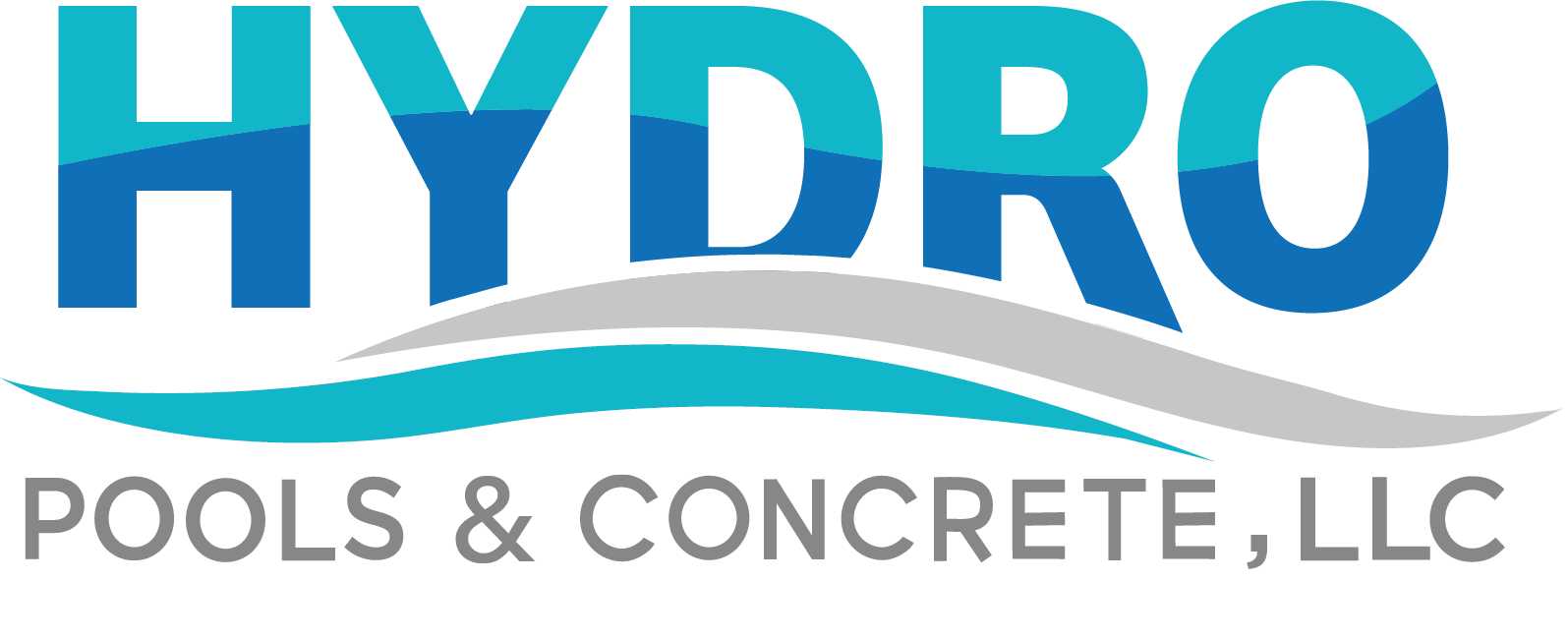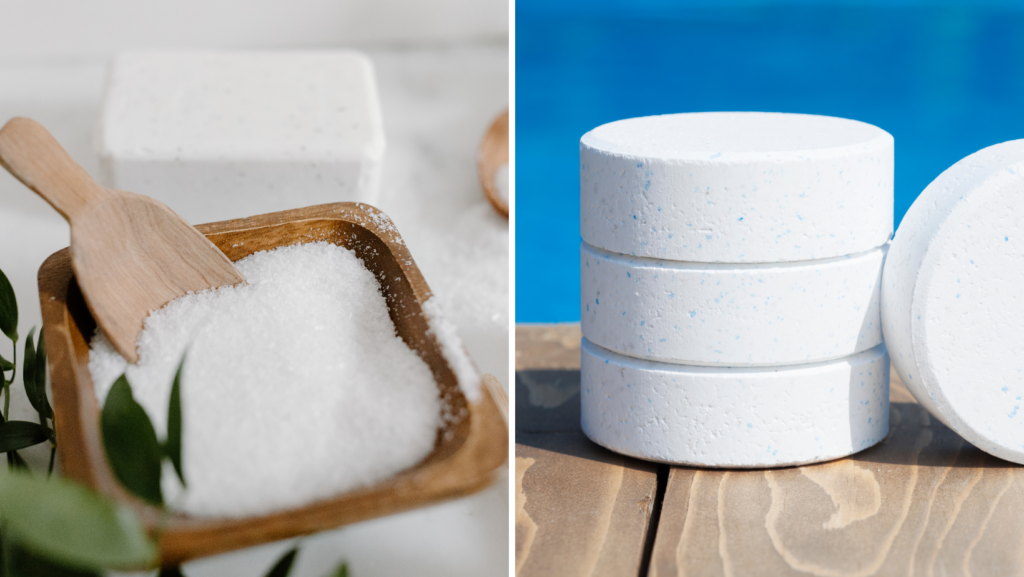What is Chlorine?
Chlorine is by far the most common type of pool system. Chlorine became a common water treatment in the early 1900s following its predecessor, bleaching powder. Chlorine is made from the electrolytic reaction of sodium hydroxide, which in its reaction leaves behind a concentrate, Chlorine. In simpler terms, it is the byproduct of a chemical reaction. Fun stuff, right?
What is Salt?
I know- you are probably quite familiar with salt. Truth be told the salt in a pool’s salt system really is just like the table salt you use at home, just in a different form. The salt that is used in food is known as Sodium Chloride (or NaCl if you remember your chemistry days). Pool salt is also Sodium Chloride but in its purest state. Pool salt is typically 99.8% Sodium Chloride or higher. Its high purity helps to prevent clogging within pool equipment. Hypothetically, if you were to use table salt in your pool system it would most likely lump and cluster, thus ruining your equipment. Understanding what type of salt to buy for your salt system is essential to ensuring your pool lasts.
Which is more effective – Chlorine or Salt Pools?
Truth be told… both! Chlorine and Salt are both effective at disinfecting the water in your pool. The main difference between a chlorine pool and a salt pool comes down to price, maintenance, and honestly, personal preference. We will get more into that later.
Salt Pool Systems: The Breakdown
Disinfecting Power:
Salt pool systems are great for a variety of reasons, however, most people appreciate that salt pools are “chemical-free”. Salt pools have gained popularity throughout the years as being a more natural alternative to chlorine pools, which is true…sort of! Salt pool systems run on salt cell converters which essentially turn pool salt into chlorine. Chlorine is a necessary component to keeping the water sanitized and clean. Although chlorine is present in salt pools, it is in lower levels than what you would find in chlorine pools. All of this to say, salt pools are a great option for people who have sensitive skin, families with children, or those who just generally want to avoid harsher chemicals on their skin.
Cost:
When it comes to cost, salt pools tend to be more expensive on the front end. Salt systems tend to take more work to install, thus increasing labor costs. Salt pool equipment is also pricier than the equipment found in chlorine systems.
Although there are high costs associated with salt equipment installation, it can be argued that salt systems are cheaper to maintain in the long run. Chlorine tablets are fairly expensive, and you need to keep a good supply on hand to maintain the balance of your pool. Salt in contrast, tends to be cheaper and doesn’t need to be used as frequently as chlorine, meaning you might run into some potential savings!
Maintenance and Balancing:
Although salt pools self-chlorinate with help from the salt cell, it is imperative that you regularly check the pool’s pH balance. Salt pools are much trickier to balance and can lead to poor sanitation or cloudy water if not properly maintained. When in doubt hire a professional to check your pools pH and alkalinity every so often to ensure your pools longevity.
There is no question about salts ability to disinfect your pool water from harmful bacteria, however, salt may be less effective at eliminating natural contaminants. Without proper balancing, there is a possibility that algae can grow in your pool. If it does, don’t fret! This balancing issue can be easily corrected with a chlorine shock if you catch it early enough.
Lastly, it is no secret that salt is naturally corrosive. Any equipment or gear in a salt pool may be prone to more wear and tear in salt water. The good news is that salt-resistant pool accessories are available on the market. These accessories may be a good option for you to ensure you have equipment and gear last for years to come.
Chlorine Pool Systems: The Breakdown
Disinfecting Power:
Chlorine is great at sanitization, which is why it has been in use for so many years! Whether the water comes into contact with harmful bacteria or natural contaminants, chlorine always effectively sanitizes, keeping your pool clean and ready to use!
With all that great disinfecting power, also comes with a higher risk of skin or eye irritation (or a lingering chlorine smell). Like most cleaning agents, the chemicals within chlorine can have nasty side effects, like drying out the hair and skin or irritating the eyes. Chlorine can also pose a greater threat to those with skin sensitivities or allergies. All of this to say, most individuals wont experience any adverse reactions. When in doubt, practice good hygiene and take a shower after every pool use.
Cost:
As we mentioned earlier, chlorine pools tend to be less expensive to install than salt pools. The equipment is cheaper and pool contractors tend to charge less for installation because chlorine equipment is a pool contractors bread and butter! The installation process has become very streamlined and should be a piece of cake for your contractor, keeping costs lower.
Maintenance and Balancing:
Similarly to salt pools, chlorine pools need to be properly balanced to be safe to use. It is a risky to have too little chlorine in the water and also risky to have too much. Too little chlorine leaves room for harmful bacteria and natural contaminants to infiltrate your pool. Too much chlorine can result in irritated skin and eyes. If you ever have any doubts about your pools chemical balance, contact your local pool contractor for testing.
Along with chemical balancing, regular shock treatments are an important piece of maintaining a chlorine pool. Shock treatments can prevent an overproduction of DBPs, also known as disinfection byproducts. DBPs are the result of the chemical reaction that occurs between chlorine and natural contaminants (like urine or sweat). DBPs can lead to diminished water quality and can also produce unpleasant odors. Regular shock treatments are an important component of keeping DBPs at bay and your pool water clean!
The Verdict
Salt and chlorine systems are both reliable options for your pool. As long as you keep your water properly balanced and maintained, both systems will work effectively and efficiently for years to come.
Our best advice to you, choose the system will work best for your needs and lifestyle and the pool will do the rest! If you would like to discuss your options with a professional, contact us today!

